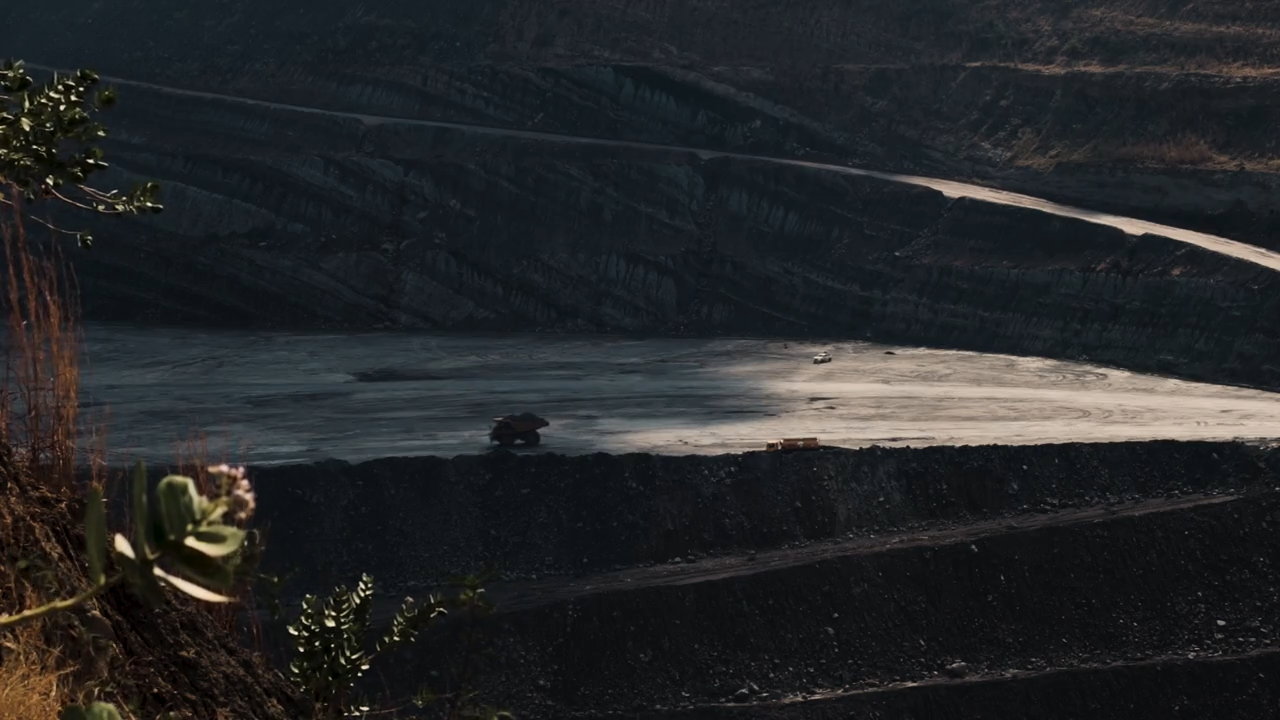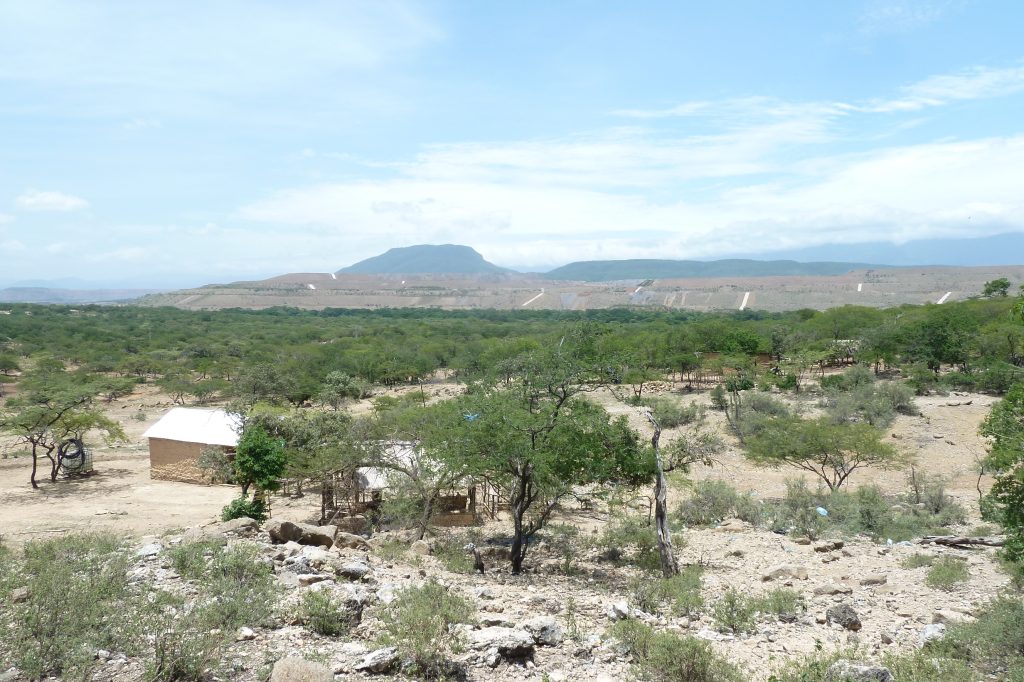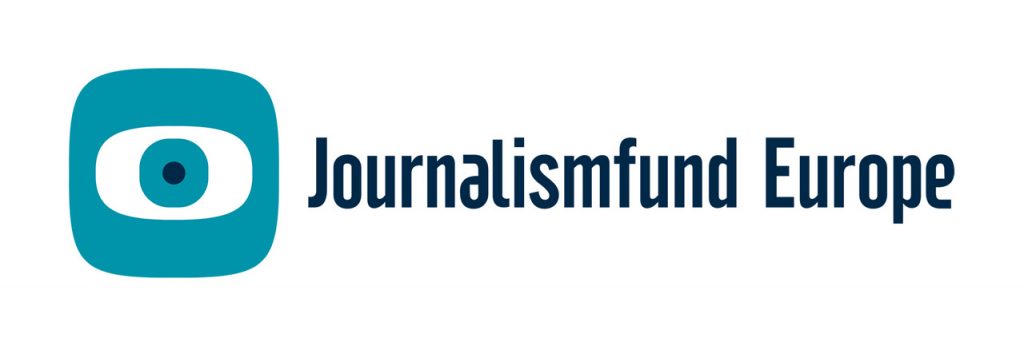By: Marcela Zuluaga C.
The exploitation of thermal coal in Colombia not only generates severe environmental impacts but also brings a series of social consequences for the communities living in the mining influence zones.
These consequences include labor exploitation, forced displacement, and the loss of social fabric. These situations are particularly concerning in the mining corridor that covers the departments of Cesar, La Guajira, and Magdalena.
El Turbión spoke with three former miners who have been affected. In their testimonies, they denounce: poor industrial safety, which exposes them to risks that compromise their physical and mental integrity; slow and insufficient attention to diseases derived from mining work, which worsens the health conditions of workers; and the systematic violation of the right to association, with dismissals and threats against those who attempt to organize unions. The few collective negotiations that take place are characterized by being precarious and unequal.
In a work accident, he lost mobility
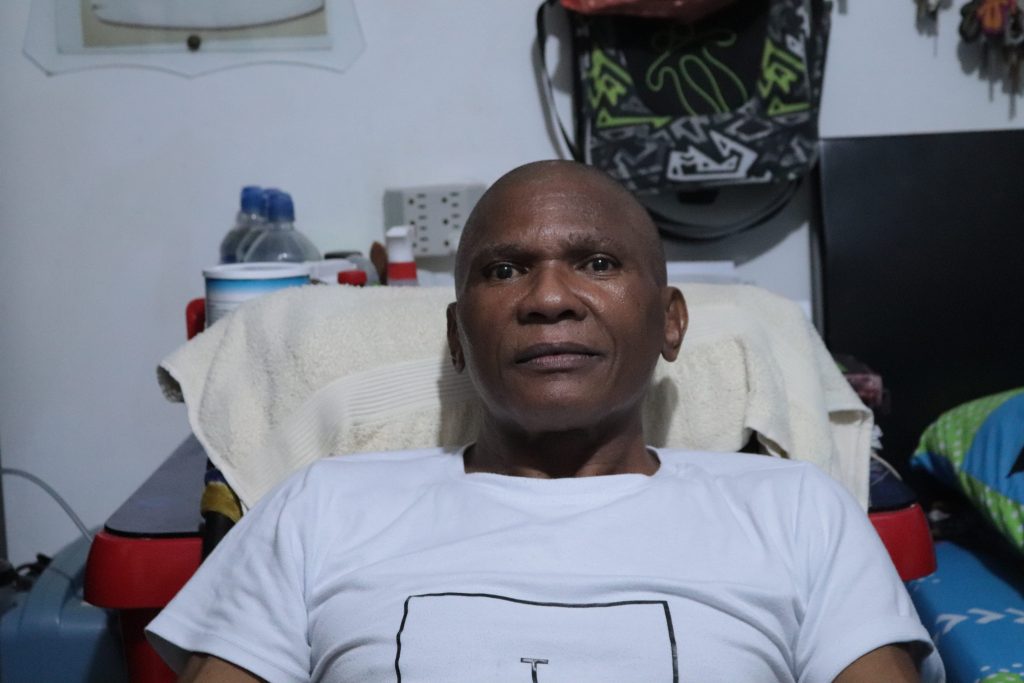
William Orozco Molina, 56 years old, was a heavy machinery operator and union leader in La Jagua de Ibirico in 2003, a mine owned by the company Carbones del Caribe, which had been exploiting the 1,869.53 hectares comprising 16 coal pits since 1996. William, in a work accident at 2:00 a.m. on September 21, 2003, lost his mobility and with it, his peace of mind.
Suddenly, a rock the size of the hopper fell and caused a strong impact on the truck, causing the hopper to lift. It was two blows that paralyzed me. I then informed the shift supervisor that I was feeling unwell.
After a rock as large as his coal truck passed over his vehicle, William Orozco was sent by the company to a health post in La Jagua de Ibirico. However, the company did not file the corresponding accident report, and since it was a medical emergency, William Orozco was operated on through the state health insurance and was never recorded as a work accident.
After his medical leave, William Orozco contacted the human resources department of Carbones del Caribe to file the corresponding report so that the Occupational Risk Administrator (ARL) would be aware of the case. But these were not the only actions he took. Orozco sued the company because, after the accident, he was dismissed from his position and because his immobility was caused by being exposed to large rocks without any prior training to manage that risk:
My work accident was due to poor operations being carried out within the mine (…) none of the workers were trained for safe mining.
In 2008, five years after the accident, Glencore bought Carbones del Caribe. The company was fined ten minimum wages for not reporting William Orozco’s accident. By that time, he had already lost his health and his mobility.
Unfortunately, the misfortunes did not stop with the work accident and the neglect by Carbones del Caribe, Glencore, and the State. William Orozco’s eldest son traveled to Barrancabermeja to study and work to help support the family and was murdered on May 12, 2015. Later, his youngest daughter fell into a deep depression and committed suicide in July 2022.
Since July 1, 2014, William Orozco’s case has been in the Supreme Court, and at the time of writing, he is still awaiting a verdict.
The journey of a former worker through occupational illness
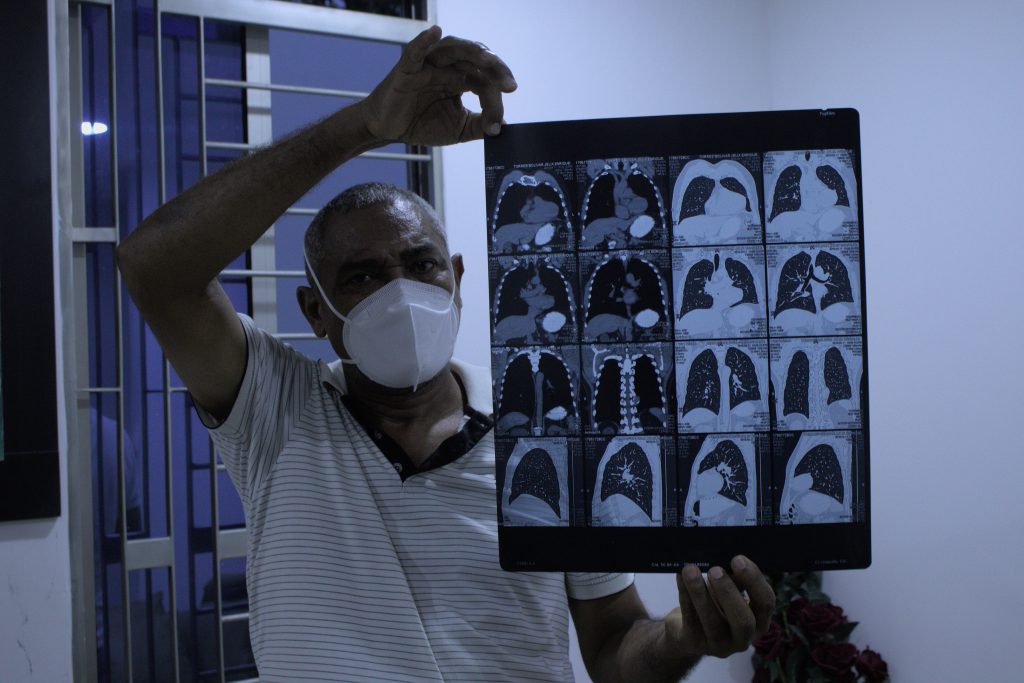
Jélix Enrique Torres Bolívar, 60 years old, acknowledges that his lung disease is due to his work at El Cerrejón, the largest open-pit coal mine in Latin America. With a trembling voice and a look full of nostalgia, he confidently states, “If I had known what mining was like, I would never have worked in a mine,” and continues:
My work accident was due to poor operations being carried out within the mine. The company did not implement the necessary controls, and none of the workers were trained to perform safe mining operations. In the mine, we have traded health for money because what we earn is not enough to cure the diseases that follow.
Jélix recounts his beginnings as a young worker in a mine at the end of 1983, operating heavy machinery for 18 years for the company Intercor, now Cerrejón, and how his health changed after two decades of work:
In 1998 and 1999, I began to feel short of breath with every activity that required physical exertion. I would tire very easily after having worked for 10-11 years without personal protective equipment.
During an occupational exam after almost 20 years of working in the mine, the doctor referred him to a pulmonologist in Valledupar, who, after seeing the diagnostic images, referred him to a specialist in Bogotá.
The initial diagnosis here was siderosis, a disease caused by iron. [But] I had not been in contact with iron.
When Jélix mentioned that he worked in a coal mine, the specialists refocused the medical studies:
They focused the studies on diseases caused by coal exploitation, and the specialists determined that I had simple nodular silicosis caused by coal and silica. To confirm it, I underwent a nasal biopsy and then an open lung biopsy.
The executives of the Cerrejón mine did not believe him because he was too young to contract silicosis, so they sent him to doctors across Colombia for further evaluations. The doctors reached the same conclusion, and in 2001, Jélix Enrique Torres Bolívar received a compensation of 34 million pesos and a 52-point score for a disability pension due to occupational disease.
The former miner feels a great disappointment towards Glencore, the company he worked for in his youth:
I worked body and soul for Cerrejón. But Glencore is more interested in its image than in the people it employs. They always tried to disqualify my condition as silicosis, saying they do not have this health problem within the company. They still deny it.
Jélix has been in continuous pulmonary treatments, in addition to undergoing chemotherapy after being diagnosed with multiple myeloma, a type of cancer. In June 2023, he received a bone marrow transplant in a hospital in Medellín and is currently recovering.
Unlike Glencore’s stance of not recognizing silicosis, José Brito, who has been the health secretary of the Sintracarbón union for 15 years and a member of the National Council of Occupational Risks representing workers, explained to El Turbión that Jélix Torres’ disease is recognized by occupational risk experts in the country.
Silicosis is one of the occupational diseases recognized by the National Council of Occupational Risks of Colombia as related to coal mining work, included in the table of occupational diseases through Decree 1477 of 2014.
The former union leader also adds that when workers are assigned the task of extracting five tons of coal, they must first remove 20 tons of rock above the coal, which is composed of cristobalite. When crushed, this material turns into a fine layer of dust known as crystalline silica, which workers inhale along with coal dust when they have to move the crushed rock.
With the help of the Sintracarbón union, we have uncovered more than 1,500 examples of workers who have fallen ill due to their work in Cerrejón, including some cases of cancer. People suffer a lot from gastritis, irritable bowel syndrome, insomnia, and mental health issues.
Meanwhile, the National Institute for Occupational Safety and Health (NIOSH) states that there are health consequences due to overexposure to respirable coal dust and crystalline silica:
It can cause respiratory diseases, pulmonary tuberculosis, chronic kidney disease, lung cancer, and silicosis.
The Institute also explains that the damage caused by coal workers’ pneumoconiosis and silicosis cannot be reversed; no medication can reverse lung damage. Therefore, prevention is essential. Treatments include vaccination against influenza and pneumonia, taking antibiotics for infections and congestion, using inhalers for airway spasms, administering oxygen, and working with a doctor to reduce the risk of heart failure.
In debt to the women miners
Dania Guzmán, a former environmental analyst for the Prodeco group who worked for four years and two months in coal mining, spoke to Turbión about her duties, the work pace, the differentiated conditions for women such as salaries, and the cases of harassment experienced inside the mines.
The first thing Dania reported was labor exploitation and discrimination against women:
I was going to be hired for only one operation initially, but when I was hired, they told me I would be handling four operations due to budget constraints (…) I lived there for about a week and then went home on weekends. (…) mainly it was about salaries, you could see that in the company, it was very noticeable. High-level management positions were not occupied by women. Only one woman was the Manager of the Occupational Health area; otherwise, it was very difficult for women to occupy such positions. Sometimes, one could be more prepared than a male colleague academically, but still be earning much less and under different conditions or ranks than male colleagues.
Regarding the different conditions for female workers in mining, Dania indicates that women also experience workplace and sexual harassment inside the mines:
Let’s say that many times cases occurred where the boss intimidated female workers. I didn’t experience it personally, but a close colleague did. Many male colleagues would suddenly call a woman, having obtained her phone number, and start harrasing her.”
Her employment ended in August 2019 amid a mass layoff, as Dania recalled:
[Glencore] announced contract terminations due to problems with coal prices and the sustainability of the operation.
Three years later, in 2021, the Prodeco group, a subsidiary of Glencore, announced the relinquishment of mining titles after nearly 30 years of exploiting and profiting from the Calenturitas and La Jagua coal mines, an action that leaves not only the employees but also the environmental liabilities of the mine unattended.
The mine closures brought problems for which the communities were unprepared, showing that Glencore does not care about the communities.
Hilda Arrieta, leader of the Women’s Network of El Paso, Colombia, denounced on May 25, 2023, at the IndustriALL Global Union facilities in Switzerland, that Glencore has turned her community into a ghost town:
In 2021, they closed the Prodeco coal mine without an adequate social plan. We are mothers of children who have turned to drugs and prostitution because there are no opportunities for them. We cannot just sit and watch this happen to our children and our community.
A transition towards poverty
Ana Catalina Herrera, a member of the CNV International labor observatory, explained to Turbión about the differentiated situations of female workers in the coal mining industry and warns that the issuance of mining titles and decarbonization without action plans will jeopardize the lives of women, especially those directly linked to companies, outsourced workers, and workers in the care economy.
The lawyer is emphatic in expressing that the realities of women and the impacts they have experienced in the coal mining industry need visibility.
We are completely in debt because suddenly much attention has been focused on all that has happened in terms of union lawsuits (…) and guaranteeing the voices of the women who have been affected, as a result of the decisions of closures and decarbonization processes, and in terms of characterizing identifying how they are, has been overlooked.
Ana Catalina also reports that the lack of transition plans has led people to organize, leading to the emergence of the Workers Collective for Just Transition, a coordination space that brings together the main mining unions to ensure the labor and community human rights in the mining influence zone.
The organization was born in 2021 due to the mass layoffs caused by the resignation of mining titles from the Calenturitas and La Jagua mines by the Prodeco Group on February 4 of that year, as well as the massive layoff by Cerrejón on February 21, dismissing 450 jobs.
Ana Catalina mentions that given the reality that «many workers built their life project around mining, then, four specific proposals on fair energy transition were created». Dismissed workers argue that it is crucial to promote economic diversification beyond extractivism, requiring support for associative projects led by former workers and communities. They also highlight the need to prepare populations in mining territories for this transition and request a new training offer both in universities and in SENA (National Learning Service), oriented towards alternative economic sectors. Finally, they propose that it is essential to establish a Social Protection Fund that guarantees the safety and access to medical treatments for sick miners, providing vital support in times of need.
Layoffs in exchange for a just transition
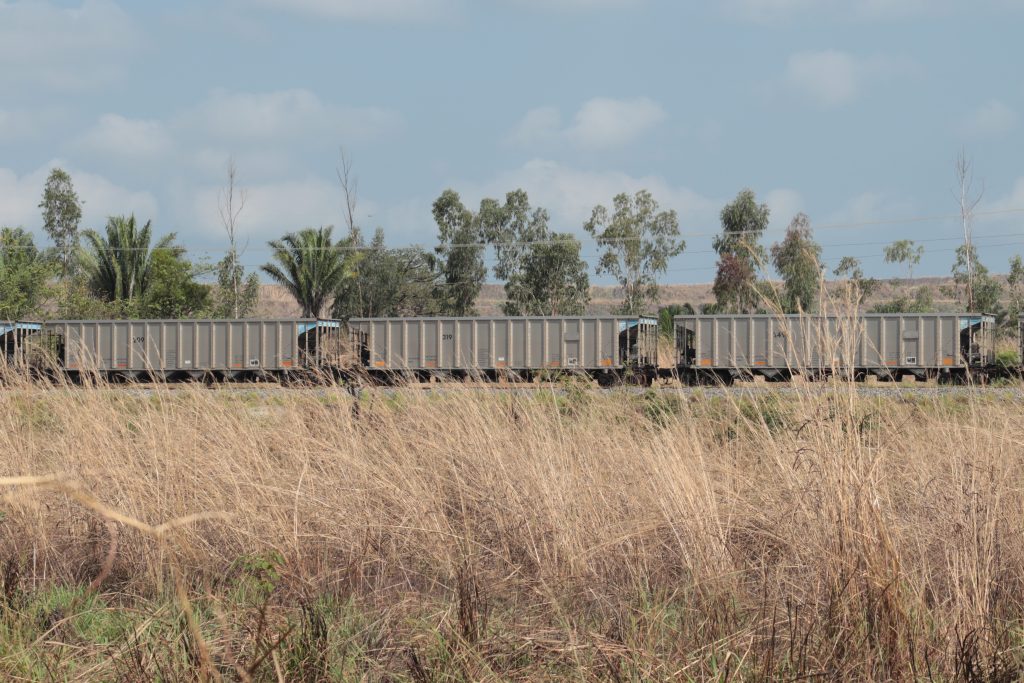
According to data from the Labor Observatory for Just Transition in the coal sector, Cerrejón is facing over 818 lawsuits, with 38% of complaints being labor-related, 23% civil, and 16% involving multiple issues.
In La Guajira, there are 217 lawsuits against the company. Workers have publicly denounced violations of their rights, excessively long and stressful work shifts, and dismissals that the company justifies as cost-cutting measures to cope with the profitability crisis it has been facing in recent years. This situation does not correspond to the reality of the thermal coal market, which has seen a price increase since the start of the war between Russia and Ukraine. According to the board of directors’ report, in 2022, Glencore’s shares increased in price by more than 30%, and the company made a profit of USD 34.1 billion (EBITDA), achieving an increase of over USD 12.8 billion in this area compared to 2021.
On the other hand, the Prodeco group, which has operated in the departments of Atlántico, Cesar, and Magdalena, faces around 577 complaints in these territories out of a total of 802 lawsuits. The majority of complaints are labor-related (52%), followed by civil lawsuits (16%), other proceedings (16%), and administrative matters (9%).
These figures precisely reflect the situation after the mining company relinquished mining titles for La Jagua and Calenturitas in Cesar, ceasing its operations and leaving nearly seven thousand workers dismissed, with 40% of obligations unfulfilled.
Glencore exploits without compensating and wins million-dollar lawsuit
Regarding the events related to Glencore’s mining operation, in the most recent case, the Colombian state lost a million-dollar lawsuit before the arbitration tribunal. According to data from the National Agency of Legal Defense of the State, the country will have to pay $37.8 billion to the multinational mining company, Glencore.
According to the lawsuit, Glencore, owner of Cerrejón and Prodeco, signed a contract with the Colombian state in 2010 to build and use the Puerto Nuevo, located in Magdalena, a port that would become one of the most important in Latin America for coal export.
Meanwhile, the Superintendence of Industry and Commerce (SIC) in 2016 opened an investigation against the multinational Glencore and its subsidiaries in Colombia for what it considered anti-competitive practices in Puerto Nuevo, Magdalena. However, for Glencore, the SIC’s investigation violated its acquired rights through the businesses and concessions it had signed with the State in 2010 and argued that the Colombian state was violating the Bilateral Investment Treaty between Switzerland and Colombia, in force since 2006.
In 2019, Glencore initiated the arbitration process before the International Centre for Settlement of Investment Disputes (ICSID), and the tribunal ruled in favor of the multinational, which had claimed compensation for damages of more than $252 billion, but the tribunal awarded only 15% of the amount claimed.
This recent loss for Colombia in international arbitration highlights the complexities and challenges of the mining industry: while the country faces the economic burden of compensating the multinational, poor labor conditions persist, and ethical standards in the mining industry and the rights of communities are not met.
This work is part of the series “Exposing Glencore’s ‘Greenwashing’,” an investigation developed by El Turbión in Colombia, Danwatch in Denmark, and MediaContinente in Sweden on the environmental, labor, and human rights impacts of Glencore’s coal mining operations.
This investigation has been developed with the support of Journalismfund Europe.
Also, it received support from International Media Support for the initial stage of the investigation.
Your support strengthens independent and reliable journalism

In recognition of El Turbión’s commitment to integrity and excellence in journalism, the outlet has obtained the Trusted Journalism Initiative Certification, promoted by Reporters Without Borders under the international standard CEN CWA 17493:2019.
Si encuentras un error, selecciónalo y presiona Shift + Enter o Haz clic aquí. para informarnos.

